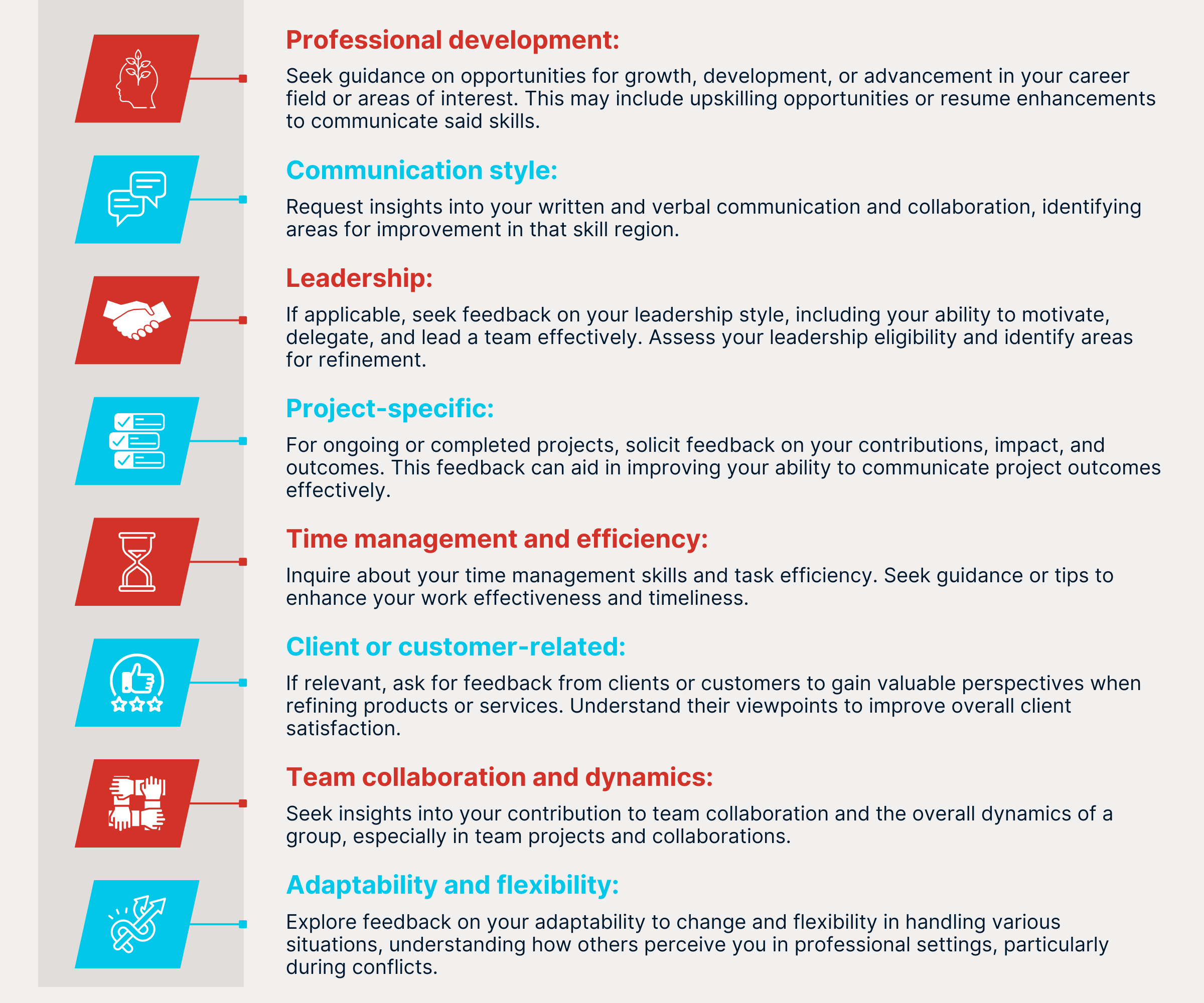Feedback, whether offered or received, plays a crucial role in your day-to-day life and, when embraced, can significantly impact your career.
In the ever-evolving landscape of professional development, possessing the ability to harness feedback is pivotal. This article explores the tangible significance of embracing feedback as a catalyst for career development.
What is feedback and why is it important
According to a 2012 study published by the National Library of Medicine, a group of medical professionals conducted a systematic review to explore the impact of feedback on postgraduate medical trainees. Their findings were clear: “There is good evidence that, if well implemented, feedback from workplace-based assessments, particularly multisource feedback, leads to a perceived positive effect on practice.”
Regardless of your interest in the medical field, this conclusion underscores two essential truths: feedback matters, and where it comes from matters too. In clinical education, feedback is defined as, “specific information about the comparison between a trainee’s observed performance and a standard, given with the intent to improve the trainee’s performance.” This definition has validity beyond clinical settings and dictionaries, holding real-life implications.
In simpler terms, feedback is a form of communication that has the potential to offer valuable insights into various aspects of our performance, behaviors, and actions.
Whether in personal relationships, academic pursuits, or professional endeavors, feedback can act as a guiding force for self-awareness, improvement, and growth. However, for feedback to fulfill its potential, the way it’s offered and received is critical. Mastering the art of receiving and applying feedback can have a tremendous impact on your personal and professional endeavors.
Diversity of feedback and why it matters
Despite being a cliché, the adage “perspective is everything” holds true when it comes to soliciting feedback. Beyond your own perspective, diversity of feedback in source and purpose can make all the difference.
By actively seeking input from a varied set of individuals, you open the door to valuable insights that may not be immediately apparent from a singular viewpoint. Here are some groups to consult when looking for valuable feedback:
- Mentors: Leverage the connections you’ve made throughout your professional career. Drawing on their wealth of experience, mentors can offer feedback based on their own professional journeys or experiences with you. Consider individuals from your past and present, such as professors from college or bosses from previous jobs, who have proven insightful.
- Career experts: Equipped with expertise in personal and professional development, career coaches and advisors can provide tailored feedback to navigate challenges and leverage strengths. Whether you encounter them through educational experiences, seek them out independently, or solicit their written advice through content, career experts can offer a holistic, timely, and objective perspective that may be unavailable elsewhere.
- Therapists or life coaches: In the pursuit of objectivity, therapy sessions or meetings with life coaches present opportunities to seek general, unbiased feedback. These professionals can offer insights from a different vantage point, contributing to your overall career direction and development, particularly in how that fits within the greater picture of your life.
- Peers: Colleagues with whom you closely collaborate can provide real-time feedback that reflects current industry trends and team dynamics. Their input can be instrumental in understanding your performance within the context of your immediate or previous professional surroundings — especially when it comes to your work on specific projects or initiatives.
- Loved ones: Whether blood-related family, chosen family, or something in between, the feedback of those who know you best should not be underestimated. Insights from loved ones provide a unique perspective on your personal strengths and reflect on your most intimate thoughts and aspirations. Feedback from this group can be personal in the best way and lead to greater alignment in your career.
Similar to informational interviews, knowing what type of feedback you are seeking before making an ask can lead to deeper insights.
If you are looking to grow or expand your skill set in a targeted area, make sure to be specific when asking for feedback. However, if you are seeking a more well-rounded perspective, ask for a wider spectrum of feedback from constructive criticism, feedback in areas where improvement is needed, to positive reinforcement, feedback that acknowledges your strengths or achievements.
Regardless of your approach, you’ve taken a productive step by seeking feedback in the first place. This graphic illustrates various types of feedback you might consider requesting:

How to receive feedback
Solicited feedback is only as valuable as the way you receive it. A wide spectrum of feedback, especially from a diverse set of contributors, can contribute to a comprehensive understanding of your strengths, successes, and areas for improvement.
We encourage you to practice resilience and view feedback as a valuable resource rather than a personal attack. When receiving feedback, it’s crucial to listen actively, ask clarifying questions, and seek specific examples. This not only shows a genuine interest in improvement but also helps you gain a deeper understanding of various perspectives. Here are a few additional considerations:
- Be open-minded: Embrace a receptive mindset that allows you to consider diverse viewpoints without preconceived notions. Open-mindedness enables you to expand your horizons and maintain a culture of learning and adaptation, where you can extract or deduce valuable insights from feedback.
- Stand your ground: While openness is beneficial, maintaining conviction in your principles and identity is equally important. If you disagree with feedback, healthy and respectful dissent encourages constructive discussions, and constructive discussions can help refine ideas and strategies.
- Stay action-oriented: Transform feedback into actionable steps for improvement. Instead of dwelling on criticisms, focus on identifying tangible tasks to address areas for enhancement and capitalize on strengths. This proactive approach demonstrates a commitment to progress.
- Keep track: Establish a system for documenting feedback received over time. Keeping a record allows you to track patterns, identify recurring themes, and measure growth in specific areas. An organized approach helps to streamline efforts toward continuous improvement.
By incorporating these considerations into your approach to feedback, you not only enhance your ability to receive and act upon constructive input but also contribute to a positive and growth-oriented professional environment when giving feedback yourself.
Implementing feedback for holistic growth
You could receive feedback from every person you know, but the only way to make it worthwhile is if you act on it. After all, the true power of feedback lies in its implementation. Once mentors, career experts, peers, and others give you feedback, take deliberate and targeted actions to address areas for improvement and capitalize on your strengths.
Develop a concrete plan based on the collective feedback you receive. This allows for measurable progress and tangible results. Moreover, take time to share the outcomes of said feedback implementation with those who provided the input. This fosters a healthy culture of accountability and reinforces your commitment to personal development. This feedback loop, encompassing insights from mentors, career coaches, and peers, creates a dynamic cycle of improvement, where feedback, both positive and negative, becomes a standard procedure of sorts, allowing for endless growth and adaptability.
Conclusion
As you navigate your professional journey, actively seeking and harnessing feedback is pivotal to create a healthy environment that fosters development and progress.
By proactively soliciting feedback from diverse sources with an open mind, you unlock valuable insights, fortify working relationships, and position yourself for success. And, on the flip side, giving artful feedback to others can create the potential to establish trust and rapport, practice communication skills, and so much more. Engaging in this reciprocal exchange, where you seek feedback as much as you give it, cultivates a culture of continuous improvement and trust.
The power of feedback lies not only in the information it provides but also in the collective and holistic impact it can have on your life’s trajectory. Try to approach feedback as an integral part of your mindset. After all, it is more than just a career strategy — it has the potential to become a driving force propelling you toward long-term success.




